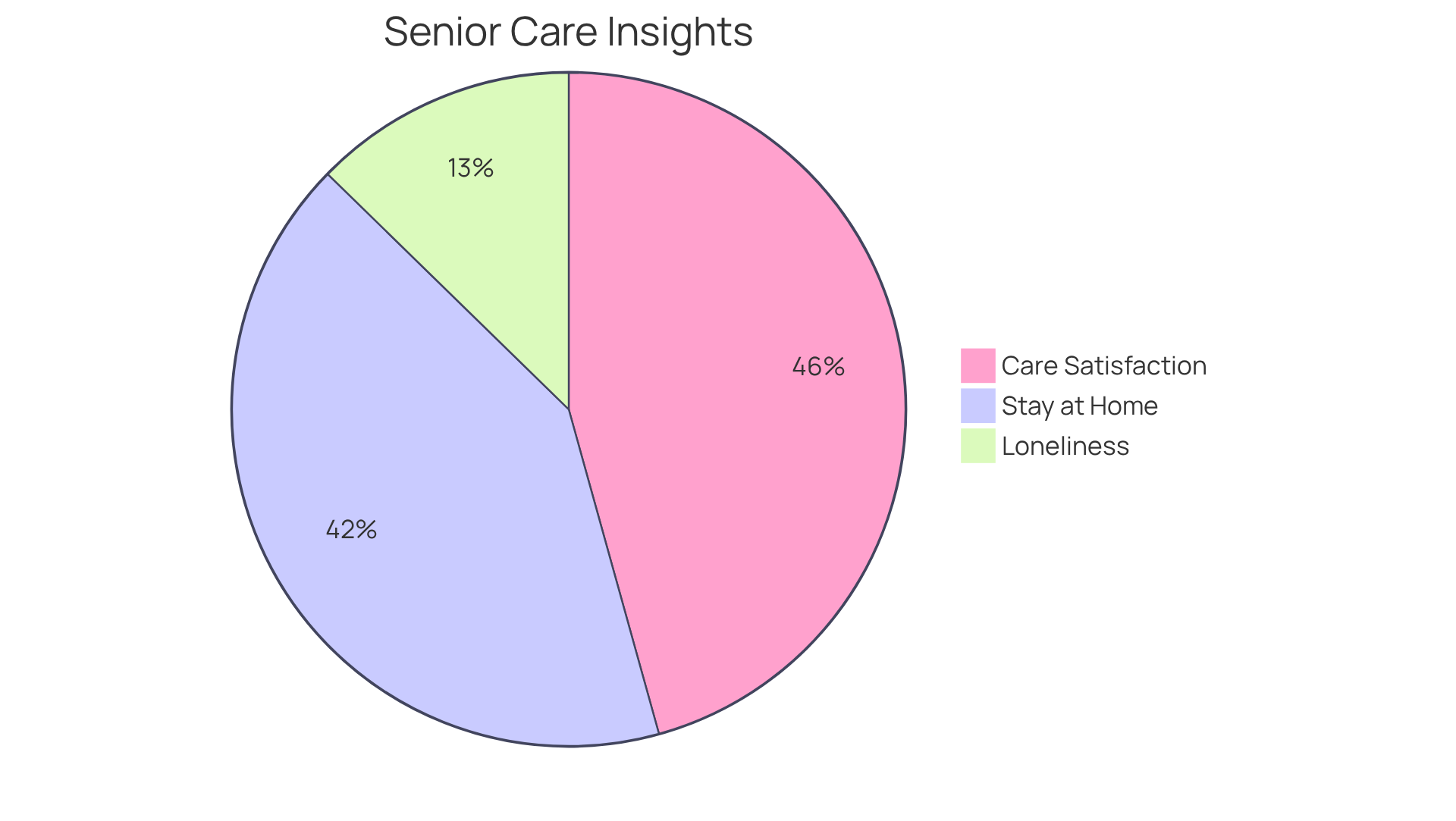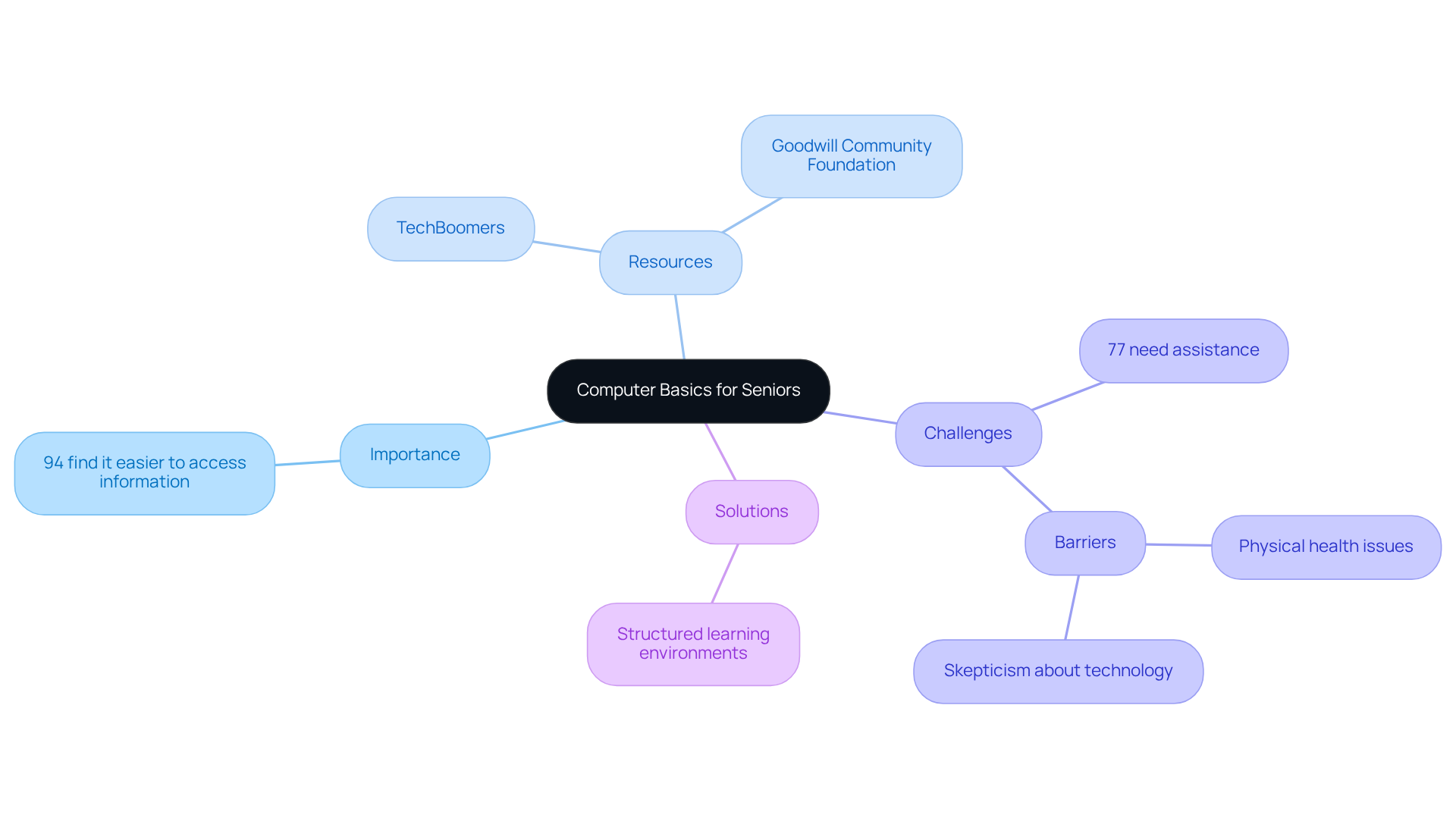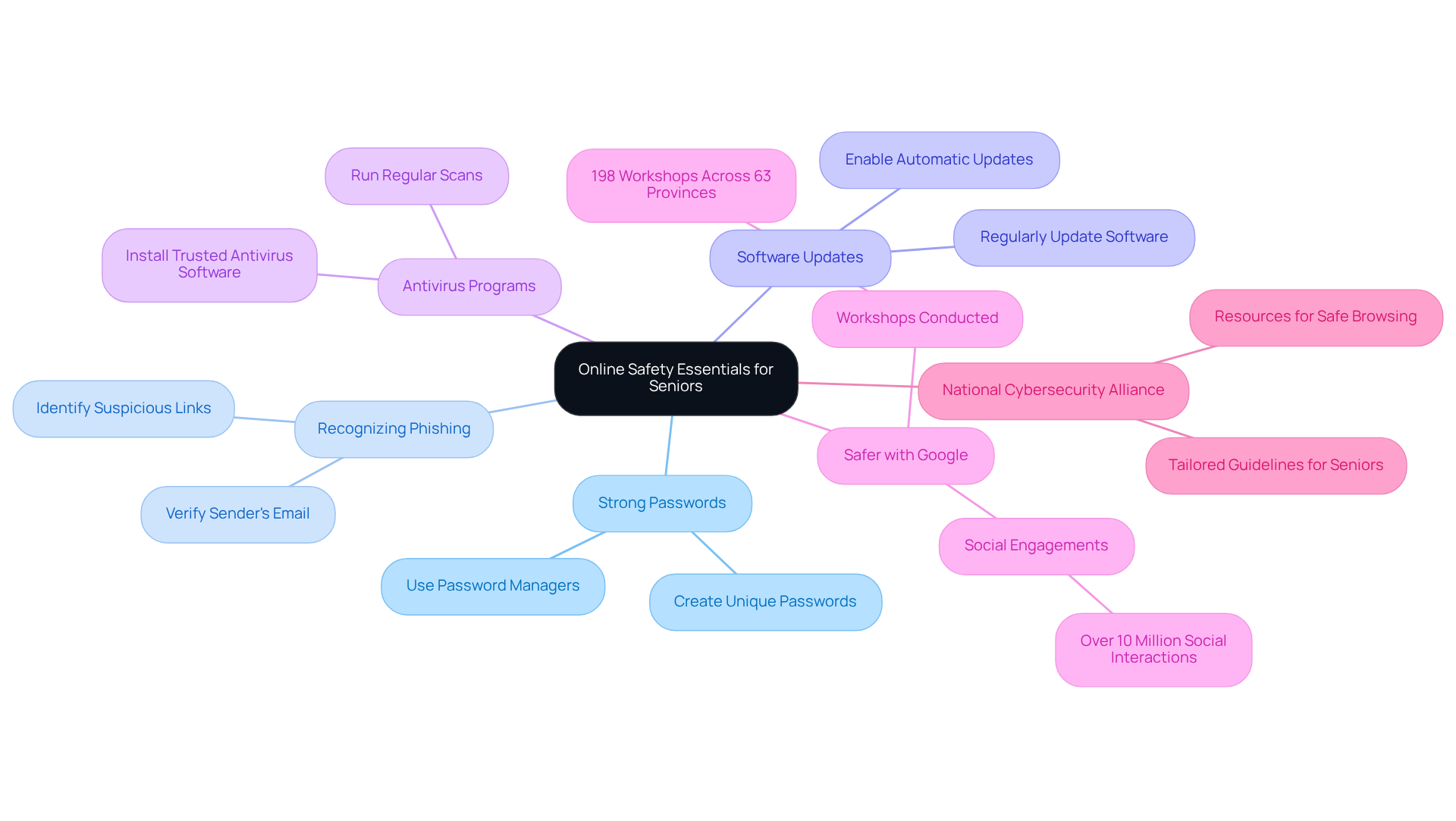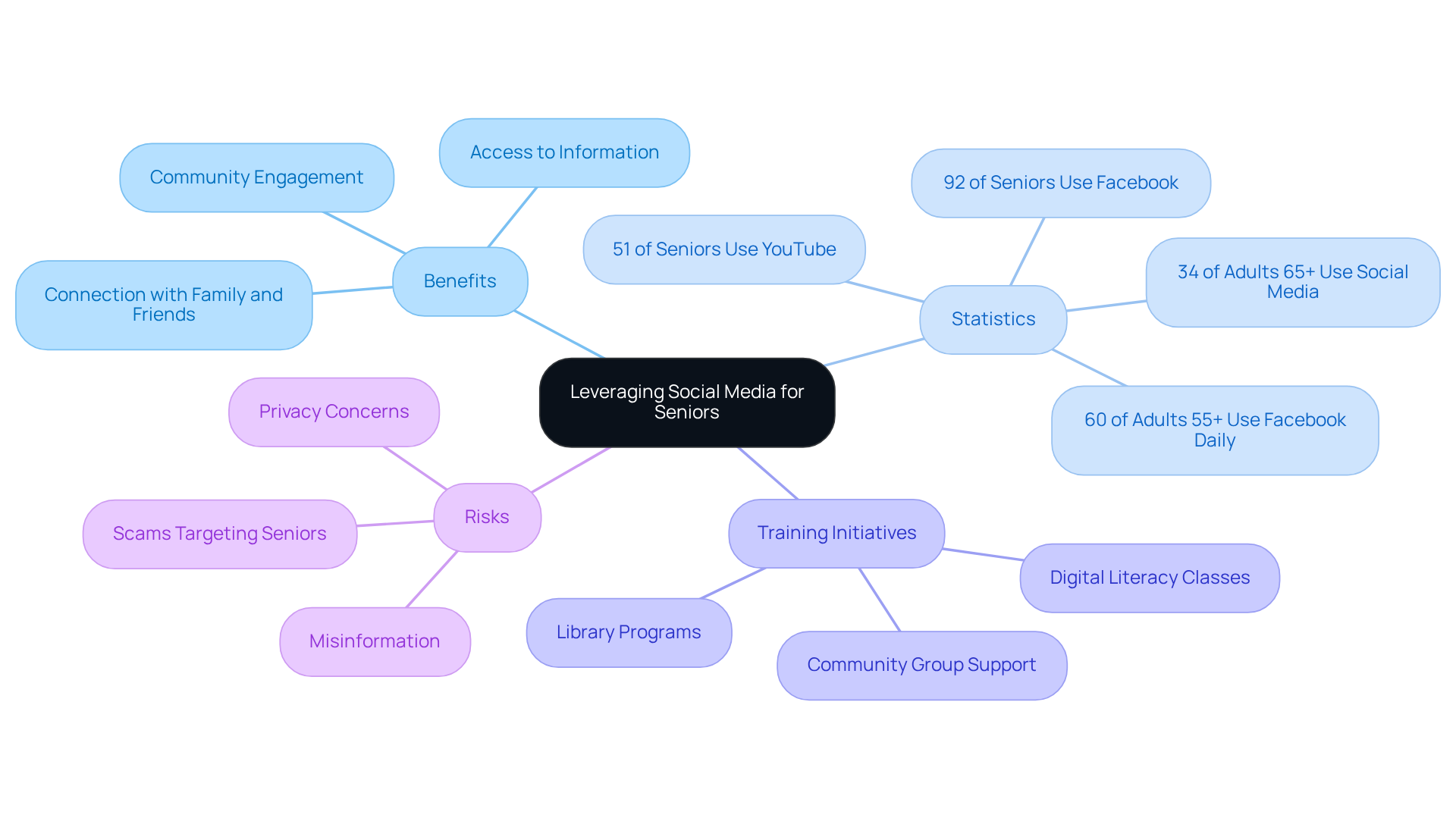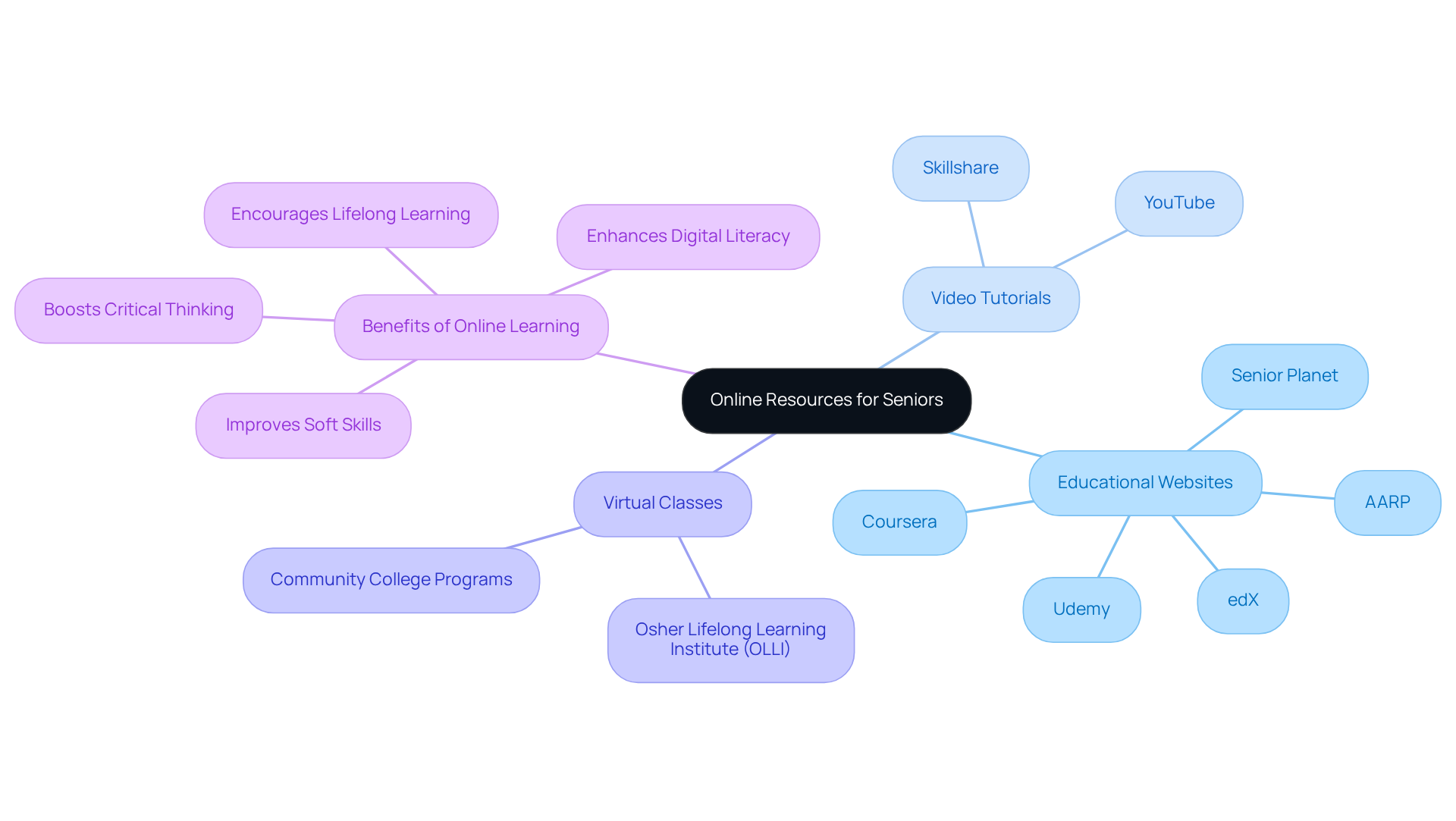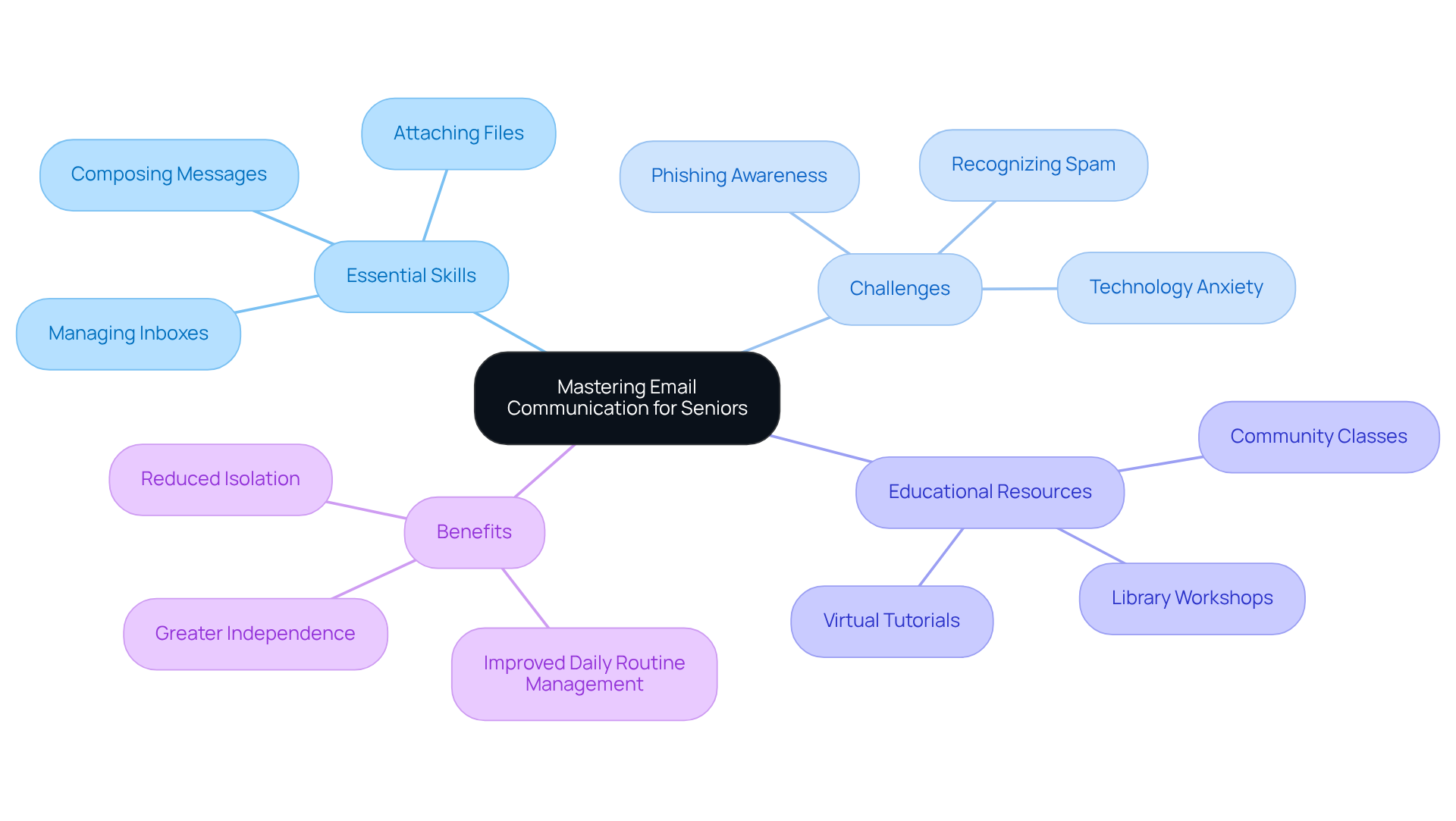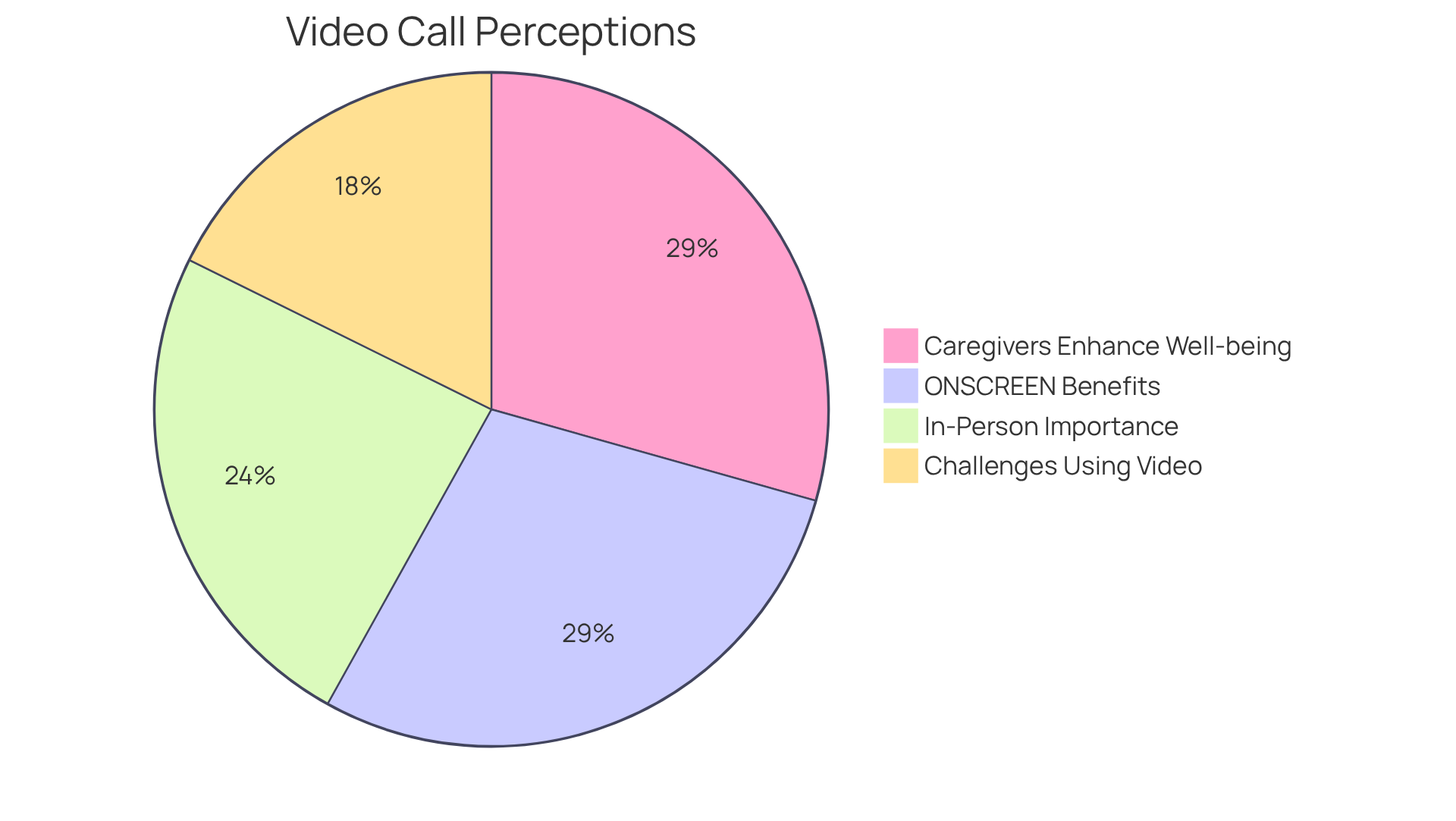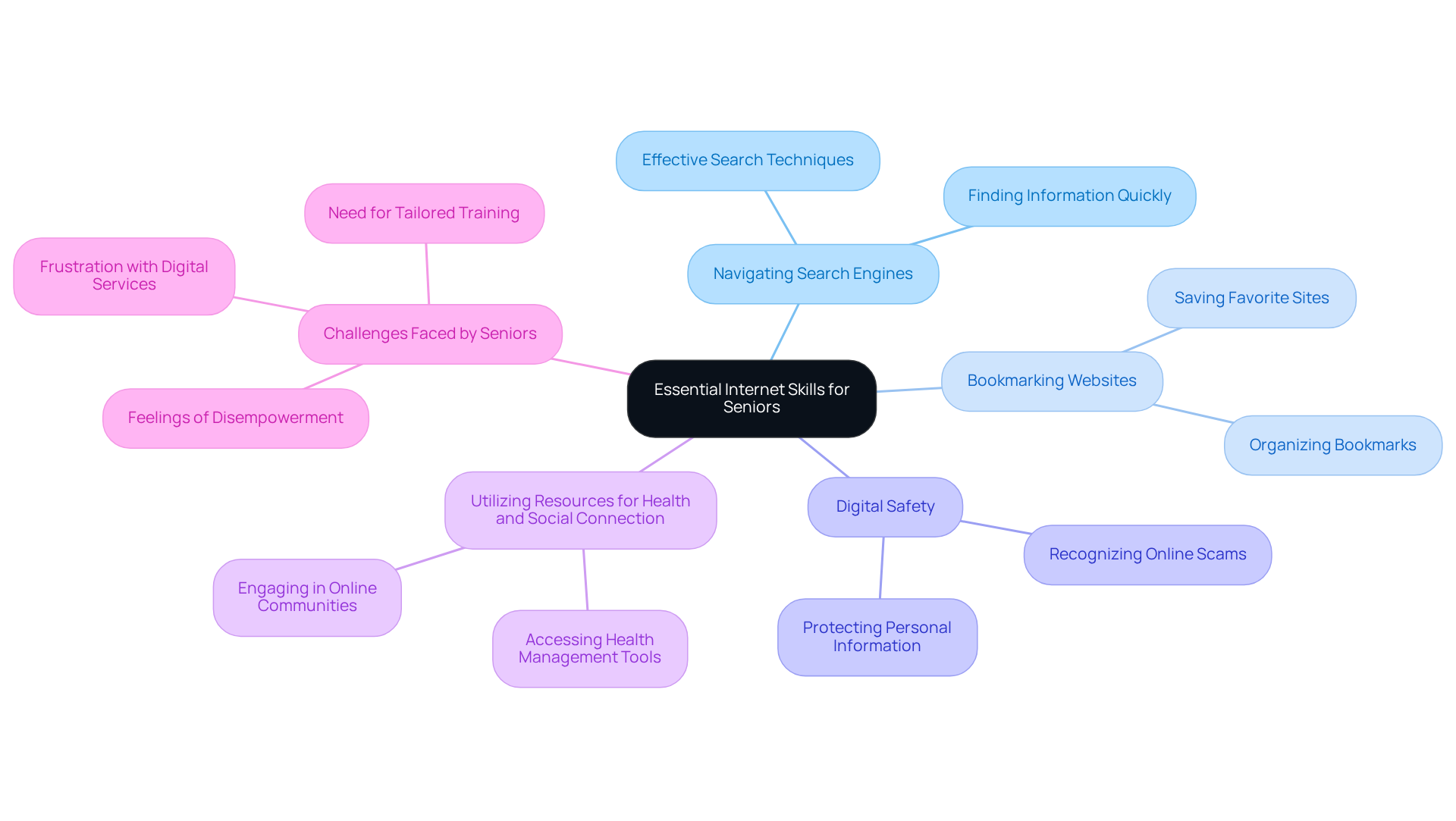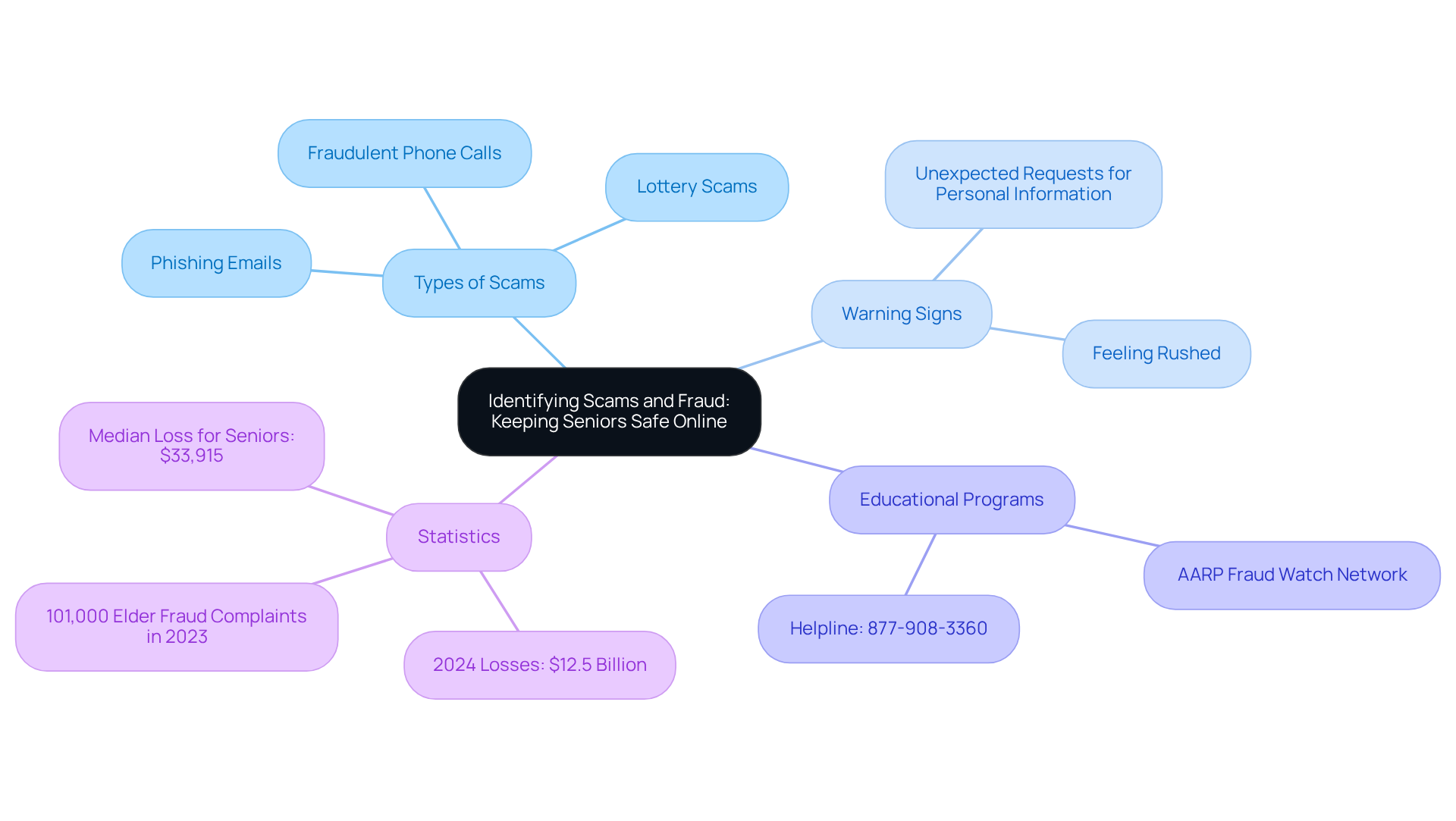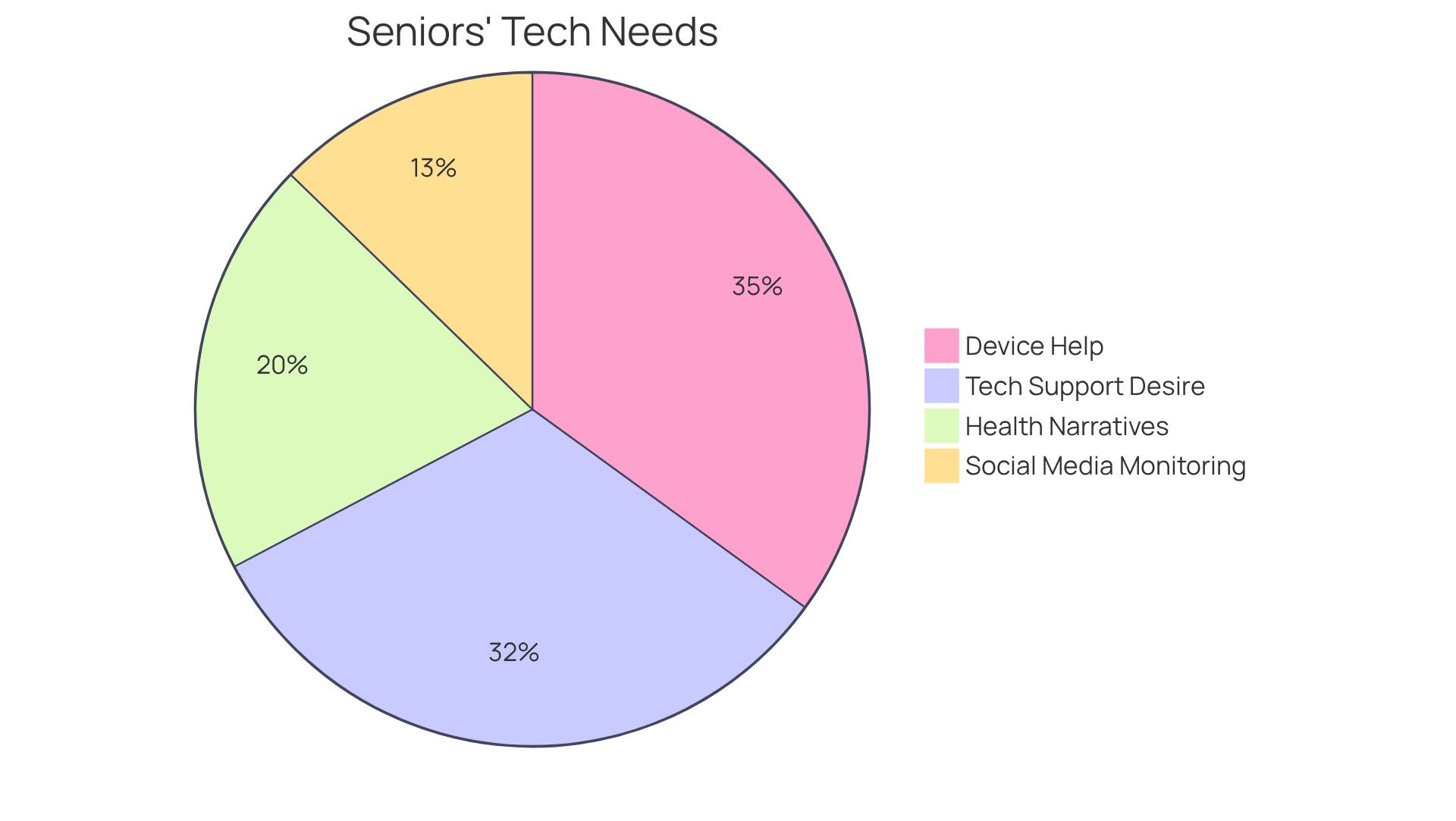Introduction
Navigating the digital landscape can feel overwhelming for many seniors, especially as technology evolves so quickly. Yet, mastering basic computer skills isn’t just important; it’s a vital tool that can greatly improve their quality of life and strengthen connections with family and friends. This article explores essential computer skills designed for older adults, highlighting how these skills can empower them to confidently and independently navigate the online world.
However, nearly 77% of seniors express a need for help in learning these skills. This raises an important question: how can family caregivers effectively bridge this gap and ensure their loved ones thrive in the digital age? By understanding the emotional challenges faced by seniors and offering compassionate support, caregivers can play a crucial role in helping them embrace technology.
Happy to Help Caregiving: Personalized Support for Seniors
At Happy to Help Caregiving, we understand the emotional challenges that come with caring for older adults. Many families face the stress of ensuring their loved ones feel secure and supported at home. Our personalized in-home assistance focuses on:
- Companionship
- Post-hospital recovery
- Respite care
- Palliative support
This approach addresses these very concerns.
Our caregivers are not just trained to assist; they’re here to offer emotional support and engage clients in enjoyable activities. This nurturing approach fosters a sense of security and comfort in familiar surroundings. It’s heartwarming to know that this personalized care not only meets the specific needs of each client but also helps alleviate feelings of loneliness and isolation. In fact, 25% of older adults report feeling lonely, which is a significant concern we aim to address.
Moreover, 82% of older adults wish to remain in their current residence for as long as possible. This highlights the importance of in-home care services, allowing them to stay in the comfort of their own homes. By creating a supportive atmosphere, Happy to Help Caregiving helps families navigate the transition to in-home care, ultimately improving the overall well-being of older adults and promoting their independence.
According to a survey by the National Association for Home Care & Hospice, over 90% of patients expressed satisfaction with their home health care. This statistic underscores the effectiveness of our compassionate, personalized support. We’re here to help, ensuring that your loved ones receive the care they deserve.
Understanding Basic Computer Skills: A Foundation for Internet Use
Computer basics for seniors are more than just technical know-how; they represent a gateway for older adults stepping into the digital world. For seniors, understanding computer basics for seniors, such as operating a computer, using a mouse and keyboard, and navigating the desktop environment, can feel daunting. Yet, computer basics for seniors are essential foundational skills. Research reveals that 94% of older adults who use the internet find it easier to access information digitally, underscoring the importance of computer basics for seniors in their lives.
Community classes and online resources, like TechBoomers, which offers helpful tutorials on various computer skills, and Goodwill Community Foundation, known for its free tutorials on email and word processing, provide tailored support for learning computer basics for seniors. These resources help older adults build their confidence in using technology by covering computer basics for seniors, making the learning process feel less intimidating.
Successful programs indicate that structured learning environments, like computer basics for seniors, significantly enhance older adults’ ability to engage with the internet. This engagement fosters a sense of connection and empowerment. However, it’s important to recognize that 77% of older adults express the need for assistance when learning computer basics for seniors. This highlights the emotional and practical challenges they face when learning computer basics for seniors.
Barriers such as physical health issues and skepticism about technology can hinder seniors’ learning journey in computer basics for seniors. As Katie Canty wisely states, ‘In all your getting, get understanding.’ This emphasizes the importance of comprehension in the learning process. By providing older adults with computer basics for seniors, we can help them navigate the online environment with greater comfort and autonomy, ensuring they feel supported every step of the way.
Online Safety Essentials: Protecting Seniors in the Digital World
Seniors, it’s so important to prioritize essential digital safety practices as part of computer basics for seniors to protect yourselves in the virtual world. You might feel overwhelmed by the online landscape, but understanding computer basics for seniors can provide key strategies that can help. Start by creating strong, unique passwords. Recognizing phishing attempts and avoiding suspicious links are also crucial steps. Regularly updating your software and using reputable antivirus programs can significantly enhance your cybersecurity.
Initiatives like Google’s ‘Safer with Google’ have been a beacon of hope, effectively informing older adults about these practices. With over 10 million social interactions and 198 workshops held throughout Vietnam, they’re making strides in promoting awareness about internet safety. It’s alarming to note that Vietnam faces 19 million digital threats each year, underscoring the urgency of these concerns for older adults.
Additionally, resources like the National Cybersecurity Alliance offer tailored guidelines specifically for older adults who are learning computer basics for seniors. These guidelines empower you to navigate the digital landscape with confidence. They include recommendations for safe browsing, recognizing scams, and protecting your personal information. Remember, with one in two older adults exposed to cyber risks daily, understanding these practices is essential for safeguarding against online threats.
You’re not alone in this journey. By taking these steps, you can feel more secure and empowered in your online interactions.
Leveraging Social Media: Connecting Seniors with Loved Ones
Social media platforms like Facebook and Instagram can be lifelines for older adults, offering them precious opportunities to connect with family and friends, share updates, and engage in community activities. It’s heartening to know that research shows 60% of adults aged 55 and older who are active on social media use Facebook daily. This highlights how significant these platforms can be in alleviating feelings of isolation.
By learning to navigate these spaces, older adults can stay in touch with their loved ones and nurture meaningful relationships. Family caregivers are essential in this journey, helping older adults set up their accounts and guiding them in using these tools effectively. It’s a beautiful way to foster connection and support.
Many libraries and community groups offer effective social media training initiatives as part of their computer basics for seniors programs, equipping seniors with the skills they need to use these platforms safely and efficiently. It’s worth noting that 62% of individuals aged 50 to 64 report needing assistance with new devices, which underscores the importance of teaching computer basics for seniors. Moreover, with 34% of individuals aged 65 and above engaging with social media, teaching computer basics for seniors is crucial for caregivers, enabling older adults to embrace these platforms.
However, it’s also vital to address potential risks, such as privacy concerns and scams, to ensure a secure digital experience. By enhancing online literacy and awareness, caregivers can help seniors enrich their social lives and improve their overall quality of life. Together, we can create a supportive environment where older adults feel empowered and connected.
Utilizing Online Resources: Learning Tools for Seniors
Seniors can truly benefit from a wealth of digital resources, like educational websites, video tutorials, and virtual classes. Platforms such as Senior Planet, AARP, Coursera, edX, and Udemy offer tailored courses that cover essential topics, from computer basics to health and wellness. These resources not only enhance digital literacy but also nurture a culture of lifelong learning and engagement among older adults.
Research shows that virtual education can significantly boost critical thinking and problem-solving skills. In fact, 85% of students report notable progress in these areas. Plus, online education can reduce the time it takes to grasp new concepts by 40% to 60%. This makes it an effective choice for older adults eager to expand their knowledge.
Many older adults are motivated by personal fulfillment and the joy of learning, which encourages their engagement with these digital tools. By embracing these resources, older adults can enhance their skills and stay actively involved in today’s technology-driven world. It’s a wonderful opportunity for growth and connection.
Mastering Email Communication: Staying Connected
Mastering computer basics for seniors, including email communication, is essential for older adults who want to stay connected with family and friends. It can be challenging, but mastering computer basics for seniors, like composing messages, attaching files, and managing inboxes effectively, opens up a world of connection. Recognizing spam and phishing emails is equally important, as these can pose significant risks. Research shows that 73% of individuals aged 65 and older feel they need help with new devices, highlighting the need for tailored educational resources focused on computer basics for seniors.
Effective programs, like community classes and virtual tutorials, have proven successful in teaching older adults computer basics for seniors, including these vital email skills. For example, many community libraries offer free workshops that teach computer basics for seniors, helping them set up email accounts and identify digital threats. These initiatives not only boost their digital literacy but also empower them to navigate the online world with confidence. In fact, 86% of individuals aged 65 and older use email, underscoring its importance in their daily lives. Seniors who engage with email often report feeling less isolated and gain better control over their daily routines, which leads to greater independence.
Communication specialists suggest a gradual approach to teaching email skills, starting with the basics and slowly introducing more complex features. This method helps ease anxiety and build confidence. By utilizing these resources and strategies, older adults can enhance their ability to stay connected through computer basics for seniors, manage personal affairs, and coordinate care with family members. Ultimately, this enriches their quality of life, allowing them to feel more engaged and supported.
Exploring Video Calling Tools: Face-to-Face Connections from Home
Video calling platforms like Zoom, Skype, and FaceTime offer older adults a wonderful way to connect face-to-face with family and friends, helping to bridge the distance that can sometimes feel overwhelming. Regular video calls can significantly reduce feelings of loneliness and depression among older adults. In fact, studies show that:
- 88% of caregivers believe these interactions enhance well-being.
- 86% of caregivers reported that ONSCREEN was beneficial for overall well-being.
Family caregivers play a crucial role in this journey by helping older adults with the installation and operation of computer basics for seniors. Programs designed to teach computer basics for seniors, such as local library tech hours, have shown great success. Many participants express greater comfort and ease in using these tools, which is truly encouraging.
Promoting frequent video calls nurtures meaningful relationships and helps preserve family bonds. It makes it easier for older adults to feel included in family gatherings and discussions. As one technology trainer wisely noted, “Older folks who talk regularly over Skype or Facetime are less likely to feel depressed too,” highlighting the mental health benefits of these interactions.
Moreover, 72.6% of older adults recognize the importance of in-person family interaction, which underscores how vital video calls are in maintaining these relationships. However, it’s essential to acknowledge that 53% of older adults find it challenging to use video calls on smartphones or tablets. This highlights the ongoing need for support and guidance, ensuring that no one feels left behind in this digital age.
Navigating the Internet: Essential Skills for Seniors
To truly support seniors in today’s digital world, it’s essential for them to gain confidence in computer basics for seniors. This includes navigating search engines effectively, bookmarking their favorite websites, and adjusting browser settings. Mastering these skills not only opens the door to vital information and services but also encourages meaningful interactions within digital communities, which can greatly enhance their quality of life.
However, many seniors face real challenges when it comes to using the internet. Research indicates that around 4.7 million older adults in the UK struggle with basic online tasks, highlighting a significant skills gap that calls for targeted educational initiatives.
Programs like Age UK’s digital initiatives have shown promise in helping seniors learn computer basics for seniors. These programs address both the emotional and practical hurdles that many elderly individuals encounter. It’s not uncommon for seniors to express feelings of frustration and disempowerment when faced with digital services. Caroline Abrahams CBE from Age UK points out that many feel overlooked as essential services move online, underscoring the need for tailored training that meets the unique challenges seniors face.
Key internet skills for older adults include:
- Understanding how to use search engines effectively to find information quickly.
- Bookmarking frequently visited sites for easy access.
- Familiarity with digital safety practices to protect personal information.
- Utilizing digital resources for health management and social connection.
By equipping seniors with these essential skills, family caregivers can empower them to navigate the digital landscape with confidence. This not only enhances their independence but also contributes to their overall well-being. Caregivers are encouraged to seek out local community classes or virtual tutorials that can provide valuable support in developing these skills.
Identifying Scams and Fraud: Keeping Seniors Safe Online
It’s so important for seniors to be aware of the scams that are out there, like phishing emails, lottery scams, and fraudulent phone calls. Recognizing warning signs—like unexpected requests for personal information or feeling rushed to make a decision—can really help reduce the chances of falling victim to these schemes.
Educational programs have shown how effective they can be in raising awareness among older adults. Initiatives like the AARP Fraud Watch Network provide essential resources and support, including a helpline at 877-908-3360 for those who need assistance. In 2023, over 101,000 elder fraud complaints were reported, which really highlights how crucial it is to take proactive steps.
The Federal Trade Commission provides valuable advice on internet safety and computer basics for seniors, helping older adults navigate the digital world with confidence. In 2024, older adults lost an astonishing $12.5 billion to scams, which underscores the critical need for fostering awareness and understanding. Together, we can protect our loved ones from the growing threat of online fraud.
Providing Ongoing Support: Encouraging Seniors in Their Digital Journey
Family caregivers play a crucial role in helping elderly individuals understand computer basics for seniors and navigate the complexities of technology. Their unwavering support, patience, and regular check-ins foster confidence in seniors’ tech skills, especially in mastering computer basics for seniors. It’s heartening to know that:
- 71% of senior adults express a desire for tech support tailored to their needs, which emphasizes the importance of teaching computer basics for seniors.
- 77% of older adults find themselves needing help to understand new electronic devices, which highlights the vital role caregivers fulfill in teaching computer basics for seniors throughout this journey.
Connecting seniors with community resources, such as tech support groups and online literacy training programs like those offered by Connected Nation, can significantly enhance their learning experience in computer basics for seniors and promote independence. Continuous assistance is essential; research shows that:
- 44% of virtual caregivers have engaged with personal health narratives, illustrating the importance of shared experiences in education.
- 28% of online caregivers using social media platforms like Facebook have monitored friends’ personal health experiences, further emphasizing the active involvement of caregivers in their loved ones’ online education.
By actively participating in their loved ones’ online learning, caregivers not only empower older adults but also help bridge the gap between isolation and social connection, ultimately enriching their lives. As Alek Argueta, a Connected Nation Digital Inclusion Trainer, beautifully states, “Enhanced access to technology literacy programs can assist in closing the divide for seniors who may feel daunted by emerging technologies.” Caregivers are encouraged to consider enrolling their loved ones in local classes on computer basics for seniors to further support their journey.
Conclusion
Empowering seniors with essential computer skills is a vital step toward enhancing their independence and quality of life. By addressing the unique challenges older adults face in the digital landscape, caregivers can help ease their transition into technology use. This support fosters a sense of connection and confidence. The insights shared throughout this article highlight the importance of personalized support and ongoing education in helping seniors navigate the complexities of modern technology.
Key points discussed include:
- The significance of basic computer skills
- The role of family caregivers in providing support
- The need for tailored resources that cater specifically to seniors
From mastering email communication to utilizing social media and understanding online safety, each aspect plays a crucial role in enabling older adults to engage meaningfully with the digital world. Moreover, recognizing the prevalence of loneliness and the desire for connection among seniors underscores the necessity of these skills in combating isolation.
In conclusion, the journey toward digital literacy for seniors is not just about technology; it’s about enhancing their lives and fostering connections with loved ones. Caregivers are encouraged to actively seek out educational resources, community programs, and ongoing support to empower seniors in their digital journey. By doing so, they can help bridge the gap between isolation and connection, ensuring that older adults feel valued, engaged, and secure in their online interactions.
Frequently Asked Questions
What services does Happy to Help Caregiving provide for seniors?
Happy to Help Caregiving offers personalized in-home assistance focusing on companionship, post-hospital recovery, respite care, and palliative support.
How does Happy to Help Caregiving address emotional challenges in caregiving?
Their caregivers provide emotional support and engage clients in enjoyable activities, fostering a sense of security and comfort in familiar surroundings.
What statistics highlight the importance of in-home care for older adults?
25% of older adults report feeling lonely, and 82% wish to remain in their current residence for as long as possible, underscoring the need for in-home care services.
What is the satisfaction rate among patients receiving home health care?
According to a survey by the National Association for Home Care & Hospice, over 90% of patients expressed satisfaction with their home health care.
Why are computer basics important for seniors?
Understanding computer basics allows seniors to access information digitally, with 94% of older adults finding it easier to use the internet when they have these foundational skills.
What resources are available to help seniors learn computer basics?
Community classes and online resources like TechBoomers and Goodwill Community Foundation offer tutorials on various computer skills tailored for seniors.
What challenges do seniors face when learning computer skills?
77% of older adults express the need for assistance due to emotional and practical challenges, such as physical health issues and skepticism about technology.
What are some essential digital safety practices for seniors?
Seniors should create strong passwords, recognize phishing attempts, avoid suspicious links, regularly update software, and use reputable antivirus programs.
What initiatives are helping seniors with online safety?
Google’s ‘Safer with Google’ program and the National Cybersecurity Alliance provide resources and guidelines specifically for older adults to enhance their digital safety.
How prevalent are cyber risks for older adults?
One in two older adults is exposed to cyber risks daily, making it crucial for them to understand digital safety practices to protect themselves online.


